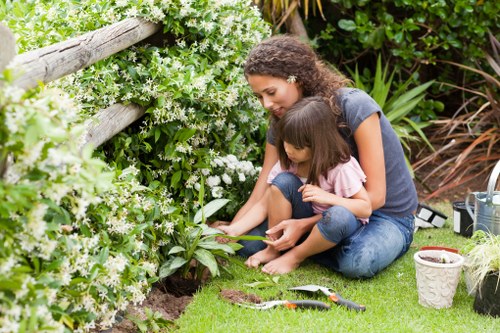Garden Maintenance in Norbiton
Introduction to Garden Maintenance

Maintaining a beautiful garden in Norbiton requires dedication, knowledge, and the right techniques. Whether you're a seasoned gardener or a beginner, understanding the basics of garden maintenance can transform your outdoor space into a vibrant and inviting area.
Garden maintenance encompasses a variety of tasks, from planting and pruning to lawn care and pest management. Each task plays a crucial role in ensuring your garden remains healthy and aesthetically pleasing throughout the year.
In Norbiton, the climate and soil conditions offer unique opportunities and challenges for garden enthusiasts. By tailoring your maintenance practices to local conditions, you can achieve a thriving garden that enhances your home's beauty and value.
Understanding the Climate in Norbiton

Norbiton enjoys a temperate climate, characterized by mild winters and warm summers. This climate is ideal for a wide range of plants, but it also requires specific maintenance strategies to cope with seasonal changes.
During the spring and summer months, gardens in Norbiton benefit from ample sunlight and moderate rainfall, promoting vigorous plant growth. Conversely, autumn and winter demand attention to protect plants from potential frost and overwatering.
By understanding the local climate, gardeners can plan their planting schedules, choose suitable plant species, and implement effective watering and protection measures to ensure year-round garden health.
Essential Garden Maintenance Tasks
Lawn Care

A well-maintained lawn is the cornerstone of any beautiful garden. In Norbiton, regular lawn care involves:
- Mowing: Keep your grass at an optimal height to promote healthy growth.
- Fertilizing: Provide necessary nutrients to enhance lawn resilience and color.
- Weed Control: Remove unwanted plants to prevent competition for resources.
- Irrigation: Ensure consistent watering, especially during dry spells.
Proper lawn care not only improves the appearance of your garden but also supports the overall ecosystem by providing a habitat for beneficial insects and microorganisms.
Planting and Pruning

Choosing the Right Plants
Selecting plants that thrive in Norbiton's climate is essential for successful garden maintenance. Consider factors such as sunlight exposure, soil type, and water availability when choosing plants.
Native plants are often a great choice as they are adapted to the local environment and require less maintenance. Additionally, incorporating a variety of plants can enhance biodiversity and create a visually appealing landscape.
Pruning Techniques
Regular pruning encourages healthy growth and maintains the desired shape of your plants. Proper pruning techniques vary depending on the plant species and growth patterns.
- Deadheading: Remove spent flowers to promote continuous blooming.
- Shaping: Trim branches and stems to maintain structure and prevent overgrowth.
- Thinning: Reduce the density of foliage to improve air circulation and light penetration.
Effective pruning not only enhances the appearance of your garden but also helps prevent diseases and pest infestations.
Pest and Disease Management

Identifying Common Pests
Gardens in Norbiton can attract a variety of pests, including aphids, slugs, and snails. Identifying these pests early is crucial for timely intervention.
Regularly inspecting your plants for signs of infestation, such as discolored leaves or visible insects, can help you take prompt action to control pest populations.
Organic and Chemical Solutions
Managing pests and diseases can be achieved through both organic and chemical methods. Organic solutions, such as introducing beneficial insects or using neem oil, are environmentally friendly and safe for beneficial wildlife.
- Biological Controls: Encourage natural predators like ladybugs and birds to keep pest populations in check.
- Neem Oil: A natural pesticide effective against a wide range of garden pests.
- Copper-Based Treatments: Useful for preventing fungal diseases without harming plants.
For severe infestations, chemical pesticides may be necessary, but they should be used sparingly and as a last resort to minimize environmental impact.
Seasonal Maintenance Tips
Spring Gardening
Spring is the perfect time to rejuvenate your garden after the winter months. Key activities include:
- Soil Preparation: Add compost or fertilizers to enrich the soil.
- Planting: Introduce new plants and vegetables suited to the growing season.
- Mulching: Apply mulch to retain soil moisture and suppress weeds.
Implementing these tasks in spring sets the foundation for a healthy and productive garden throughout the year.
Summer Care
During the summer, focus on maintaining adequate hydration and protecting plants from heat stress. Regular watering, especially during dry periods, is essential.
- Shade Cloths: Use to shield delicate plants from intense sunlight.
- Pruning: Remove excess growth to improve air circulation.
- Pest Monitoring: Stay vigilant for signs of pest activity and act promptly.
Autumn Preparations
Autumn is a time to prepare your garden for the colder months. Key maintenance tasks include:
- Leaf Removal: Clear fallen leaves to prevent fungal diseases.
- Planting Bulbs: Plant spring-flowering bulbs before the first frost.
- Garden Clean-Up: Trim perennials and remove dead plant material.
Winter Care
Winter maintenance focuses on protecting plants from frost and reducing garden activity to conserve energy. Consider the following:
- Mulching: Apply a thick layer to insulate plant roots.
- Covering: Use frost covers or burlap to protect sensitive plants.
- Tool Maintenance: Clean and store garden tools properly to extend their lifespan.
Creating a Sustainable Garden
Water Conservation
Sustainable garden maintenance in Norbiton includes practices that conserve water and reduce environmental impact. Implementing efficient watering systems is crucial.
- Drip Irrigation: Delivers water directly to plant roots, minimizing evaporation.
- Rainwater Harvesting: Collect and store rainwater for garden use.
- Mulching: Reduces water loss by keeping the soil moist and cool.
Composting
Composting transforms organic waste into rich soil amendments, enhancing soil fertility and structure. Benefits of composting include:
- Soil Enrichment: Adds essential nutrients to the soil.
- Waste Reduction: Minimizes household waste by recycling organic materials.
- Improved Soil Structure: Enhances soil aeration and drainage.
Setting up a compost bin in your garden is a simple and effective way to contribute to sustainable gardening practices.
Choosing Native Plants
Native plants are well-adapted to the local climate and soil conditions, requiring less maintenance and resources. Advantages of native plants include:
- Low Maintenance: Less need for watering, fertilizing, and pest control.
- Biodiversity Support: Provide habitat and food for local wildlife.
- Environmental Resilience: Better withstand local pests and diseases.
Incorporating native plants into your garden not only reduces maintenance efforts but also supports the local ecosystem.
Professional Garden Maintenance Services
Benefits of Hiring Professionals
While DIY garden maintenance is rewarding, enlisting professional services can enhance your garden's health and beauty. Benefits include:
- Expert Knowledge: Professionals bring expertise in plant care, pest management, and landscape design.
- Time Efficiency: Save time by delegating maintenance tasks to skilled gardeners.
- Customized Care: Receive tailored maintenance plans that suit your garden's specific needs.
In Norbiton, numerous garden maintenance companies offer comprehensive services to ensure your garden remains pristine and flourishing.
Choosing the Right Service
Selecting the right garden maintenance service involves considering factors such as experience, range of services, and customer reviews.
- Experience: Look for companies with a proven track record in garden maintenance.
- Services Offered: Ensure they provide the specific services you need, such as lawn care, pruning, or pest control.
- Reputation: Read reviews and ask for references to gauge customer satisfaction.
Cost Considerations
Garden maintenance costs can vary based on the size of your garden, the complexity of services, and the frequency of visits. It's essential to obtain detailed quotes and understand what is included in each service package.
Investing in quality garden maintenance can increase the longevity and beauty of your garden, making it a worthwhile expenditure.
DIY Garden Maintenance Tips
Basic Tools You’ll Need
Maintaining your garden effectively requires having the right tools. Essential tools for garden maintenance in Norbiton include:
- Pruning Shears: For trimming and shaping plants.
- Lawn Mower: Keeps your grass at the desired height.
- Garden Fork: For aerating soil and removing weeds.
- Watering Can or Hose: Necessary for consistent plant hydration.
Time Management
Effective garden maintenance requires good time management. Consider scheduling regular maintenance sessions to stay on top of necessary tasks.
- Weekly Tasks: Mowing, weeding, and inspecting plants.
- Monthly Tasks: Fertilizing, pruning, and pest control measures.
- Seasonal Tasks: Soil preparation, planting, and seasonal clean-ups.
By organizing your maintenance schedule, you can ensure your garden remains healthy and well-kept without feeling overwhelmed.
Best Practices for Sustainable Gardening
Adopting sustainable gardening practices not only benefits the environment but also promotes a healthy garden. Key practices include:
- Reducing Chemical Use: Opt for organic fertilizers and pest control methods.
- Encouraging Biodiversity: Plant a variety of species to support different wildlife.
- Water Efficiency: Implement watering techniques that minimize waste.
Embracing sustainability in your garden maintenance routine can lead to a more resilient and thriving garden.
Enhancing Garden Aesthetics
Landscape Design Tips
A thoughtful landscape design can elevate the beauty of your garden. Consider the following tips:
- Plant Variety: Incorporate a mix of plant types, colors, and textures for visual interest.
- Pathways and Borders: Define spaces with well-placed paths and garden borders.
- Focal Points: Create focal points like statues, fountains, or specimen plants to draw attention.
Lighting Solutions
Outdoor lighting can transform your garden into a captivating space during the evenings. Effective lighting solutions include:
- Solar Lights: Eco-friendly and easy to install.
- String Lights: Add a warm and inviting ambiance.
- Spotlights: Highlight specific garden features or pathways.
Seasonal Color Schemes
Changing color schemes with the seasons can keep your garden vibrant year-round. Consider incorporating seasonal flowers and plants that offer different colors and bloom times.
- Spring: Tulips, daffodils, and crocuses bring fresh and bright colors.
- Summer: Sunflowers, marigolds, and roses add bold and lively hues.
- Autumn: Chrysanthemums, asters, and ornamental grasses provide warm and rich tones.
- Winter: Evergreens and winter-blooming plants maintain color during the colder months.
Maintaining Garden Tools
Regular Cleaning
Proper maintenance of your garden tools ensures their longevity and efficiency. Regularly clean tools to remove dirt, sap, and rust.
- Washing: Use water and mild soap to clean tool surfaces.
- Drying: Thoroughly dry tools to prevent rust formation.
- Oiling: Apply a light coat of oil to metal parts to protect against corrosion.
Sharpening and Repair
Keep cutting tools sharp for effective plant maintenance. Sharpen blades using a file or sharpening stone, and repair any damaged parts promptly to maintain tool functionality.
Proper Storage
Store garden tools in a dry, organized space to prevent damage and ensure easy access. Using tool racks or sheds can help keep your tools in good condition and ready for use.
Eco-Friendly Garden Practices
Composting and Recycling
Recycling garden waste through composting reduces landfill contributions and enhances soil quality. Start by collecting organic waste such as fallen leaves, grass clippings, and kitchen scraps in a compost bin.
Rainwater Harvesting
Capture and store rainwater for garden use to conserve water resources. Installing rain barrels or cisterns can provide a sustainable water supply for irrigation.
Organic Fertilizers
Use organic fertilizers like compost, manure, and bone meal to nourish your plants naturally. These fertilizers improve soil health without the harmful effects of synthetic chemicals.
Conclusion
Maintaining a garden in Norbiton is a fulfilling endeavor that combines artistry with practicality. By understanding the local climate, implementing essential maintenance tasks, and adopting sustainable practices, you can cultivate a lush and vibrant garden that enhances your home's beauty.
Whether you choose to manage your garden independently or seek professional services, the key to successful garden maintenance lies in dedication, knowledge, and a passion for nurturing nature.
Ready to transform your garden? Contact us today to book your garden maintenance service and enjoy a stunning outdoor space all year round!